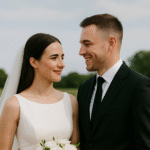Stranded Woman Asks for a Ride—Three Years Later, She Realizes Her Driver Was Basketball Superstar Caitlin Clark

It was a bitterly cold November evening in Iowa City—one of those nights where even the city’s charm seemed hidden beneath layers of frost and fog. On a quiet backroad, most drivers were too focused on getting home to notice a stalled car by the curb, its hood open and steam pouring out into the night. But one driver noticed. She didn’t just slow down—she stopped.
That driver? None other than Caitlin Clark. But at that moment, she was just a kind stranger behind the wheel of a modest car.
Clark, already rising as a star at the University of Iowa, had just finished a grueling late-night practice. Tired but content, she took her usual quiet route home to avoid traffic. That simple detour turned into an extraordinary encounter—one that would come full circle years later in the most heartwarming way imaginable.
The woman stranded on the side of the road was Elena, a single mother juggling groceries, exhaustion, and a broken-down vehicle. She was trying to make it home to her 7-year-old son, Max. Her phone had no signal. Her options were quickly running out. And the cold was creeping in.
Clark pulled up and rolled down her window. “Need some help?”
Elena hesitated. She didn’t recognize the young woman. But Clark’s sincerity was evident—calm eyes, no rush in her voice, just a genuine willingness to help. Elena accepted the ride.
What followed was a 15-minute drive filled with laughter, empathy, and a connection neither of them could have predicted. Elena talked about Max—his obsession with basketball, and how he idolized a player named Caitlin Clark. Clark smiled but said nothing. She asked questions. Listened. Shared basketball tips. But not once did she reveal her identity.
At the end of the ride, Clark handed Elena a simple card with her number. “Let me know about your car. Maybe I can help.”
And help she did.
The next day, Elena’s car was towed, repaired, and returned to her driveway—completely paid for. A note was left inside the vehicle: “Pay it forward when you can.”
Elena was stunned. She still had no idea who Caitlin Clark was. To her, she was just a compassionate stranger who had turned a night of panic into a story of hope.
Three years passed.
Max was now 10, still dribbling in the driveway, still shouting Caitlin Clark’s name as he launched jumpers toward the hoop. And Elena—still thinking about the stranger who had helped her that night—received an email that would change everything again.
The University of Iowa’s basketball team was co-hosting a charity event focused on single parents and underserved families. Elena, nominated by a coworker, was invited to share her story. Nervous but inspired, she agreed.
She stood on stage in front of hundreds. Her voice shook at first, then steadied as she shared the story of being stranded, rescued, and uplifted by a woman whose name she still didn’t know. “She asked for nothing,” Elena told the crowd. “She didn’t even tell me her name. But she changed everything for me.”
And in the front row, Caitlin Clark was clapping harder than anyone else.
When the event ended, Clark approached Elena backstage. “Your story was beautiful,” she said, her voice gentle, familiar. “I feel like we’ve met before.”
Elena’s eyes widened. She stared at Clark’s face—then gasped.
“It was you.”
Clark smiled. “Guilty as charged.”
It was an emotional reunion. Tears. Laughter. Gratitude that words couldn’t contain. The woman who had changed Elena’s life had become a household name. And Elena—who had once been stranded in the cold—was now an invited speaker at a major university event.
Clark, ever humble, had a simple reply: “You’ve been paying it forward ever since. That’s what really matters.”
But the story didn’t end there.
Clark invited Elena and Max to their first Hawkeyes game, courtside tickets with VIP access. After the game, Clark brought Max onto the court. They shot hoops. Passed the ball. Laughed. It was the kind of memory most kids only dream of. And Max? He lived it.
He left the arena with a signed basketball, a custom Hawkeyes jersey, and a fire in his heart to pursue basketball even harder.
As the months passed, Clark continued to check in on them. She encouraged Max’s progress, sent the occasional motivational message, and quietly made sure that both he and Elena were doing okay.
And Elena? She took the original message—“Pay it forward”—and ran with it. She began volunteering at nonprofits for single mothers. Shared her story. Helped others find hope. Eventually, she joined Clark as part of a new outreach program to empower families and encourage mentorship in underserved communities.
At one event, Elena stood in front of thousands. She told the story again—the breakdown, the ride, the act of kindness that had changed her life.
“Kindness,” she said, “isn’t just an action. It’s a ripple. It’s a movement.”
Clark joined her onstage, hand on her shoulder. “You’ve taken what was given and turned it into something extraordinary,” she said. “This world needs more of that.”
From that one cold night to a national speaking platform, from a broken car to a thriving family, the ripple effect of kindness had come full circle.
And it all started because one young woman—tired, post-practice, unknown—stopped her car and said, “Need some help?”
She did more than help. She inspired a legacy.
Because Caitlin Clark didn’t just change the game—she changed a life.




